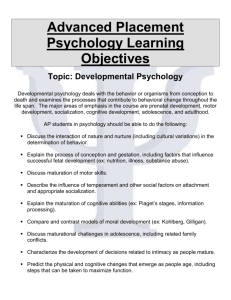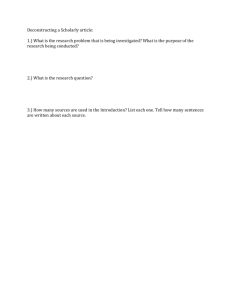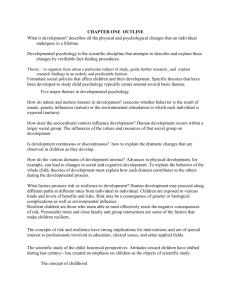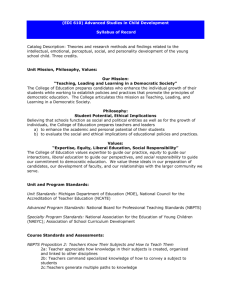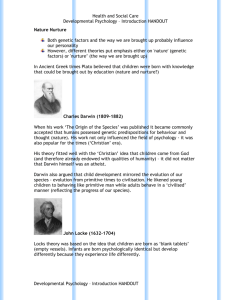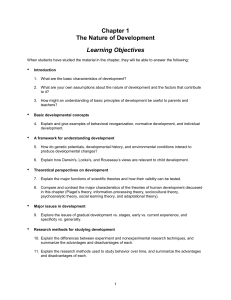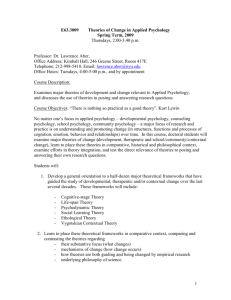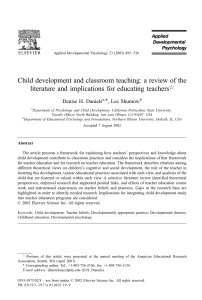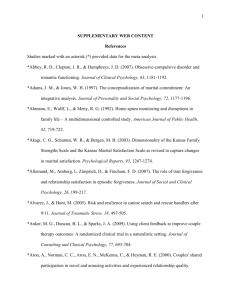Family Systems Theory - American Psychological Association
advertisement
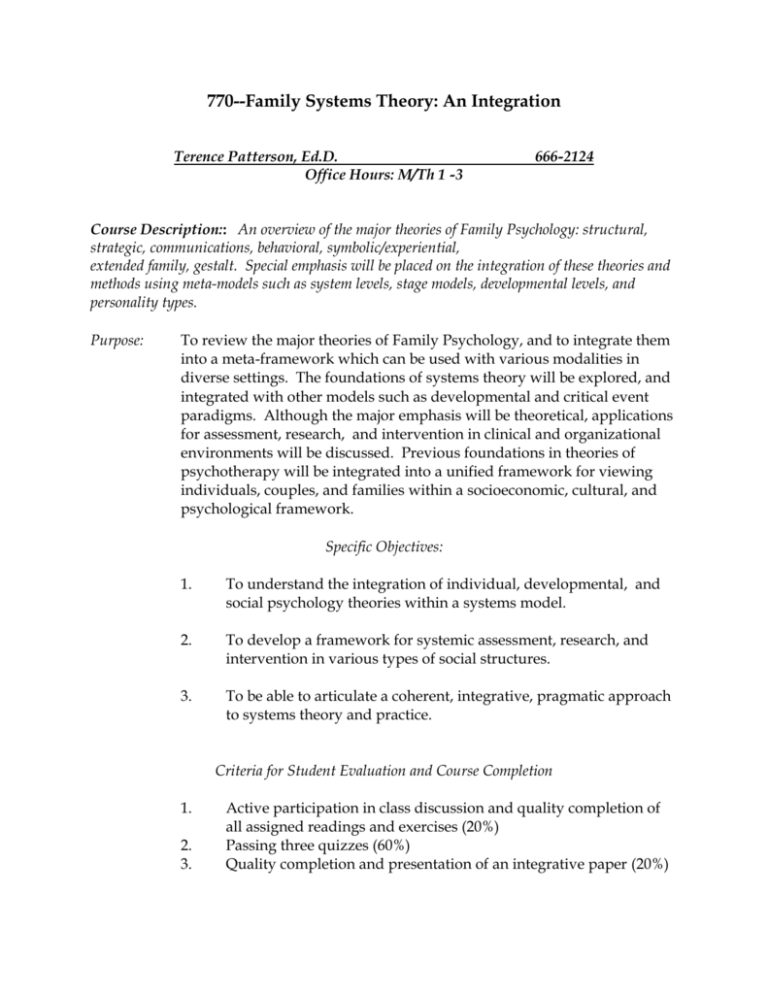
770--Family Systems Theory: An Integration Terence Patterson, Ed.D. Office Hours: M/Th 1 -3 666-2124 Course Description:: An overview of the major theories of Family Psychology: structural, strategic, communications, behavioral, symbolic/experiential, extended family, gestalt. Special emphasis will be placed on the integration of these theories and methods using meta-models such as system levels, stage models, developmental levels, and personality types. Purpose: To review the major theories of Family Psychology, and to integrate them into a meta-framework which can be used with various modalities in diverse settings. The foundations of systems theory will be explored, and integrated with other models such as developmental and critical event paradigms. Although the major emphasis will be theoretical, applications for assessment, research, and intervention in clinical and organizational environments will be discussed. Previous foundations in theories of psychotherapy will be integrated into a unified framework for viewing individuals, couples, and families within a socioeconomic, cultural, and psychological framework. Specific Objectives: 1. To understand the integration of individual, developmental, and social psychology theories within a systems model. 2. To develop a framework for systemic assessment, research, and intervention in various types of social structures. 3. To be able to articulate a coherent, integrative, pragmatic approach to systems theory and practice. Criteria for Student Evaluation and Course Completion 1. 2. 3. Active participation in class discussion and quality completion of all assigned readings and exercises (20%) Passing three quizzes (60%) Quality completion and presentation of an integrative paper (20%) Required Text: Mikesell, R.H., Lusterman, D-D., & McDaniel, S.H. (1995). Integrating Family Therapy. Washington, D.C.: American Psychological Association. Recommended: 1. Atkinson, J.M., & Coia, D.A. (1995). Families coping with schizophrenia. New York: 2. Bedrosian, R.C., & Bozicas, G.C. (1994). Treating family of origin problems. 3. Blumstein, P., & Schwartz, P. (1983). American couples. New York: Morrow, 4. Boyd-Franklin, N., Steiner, G.L., & Boland, M.G. (1995). Children, families, 5. Bray, J.H. (Ed.). 1995). Methodological Advances in Family Psychology. 6. Byng-Hall, J. (1995). Rewriting family scripts. New York: Guilford. 7. Carlson, J. (Ed.). (1992). Compulsory family counseling. Topics in Family Psychology and 8. Corey, Corey, & Callanan (1991). Theory and Practice of Counseling and Psycho 9. Corey, Corey, & Callanan (1991). Manual for Theory and Practice of 10. Cummings, E.M. & Davies, P. (1994). Children and Marital Conflict. New 11. Dym, B. & Glenn, M.L. (1993). Couples. New York: Harper Perennial. 12. Friedman, S (ed.) (1995). The reflecting team in action. New York: Guilford. 13. Gambrill, E. (1990). Critical Thinking in Clinical Practice. San Francisco: Jossey-Bass. 14. Hansen, J.C. & Liddle, H.A. (1983). Clinical implications of the family life cycle. Rockvi 15. Harway, M. (Ed.) (1996). Treating the changing family. New York: Wiley. 16 Hoffman, L. (1981). Foundations of Family Therapy. New York: Basic Books. 17. Imber-Black, E., & Roberts, J. (1992). Rituals for Our Times. New York: New and HI Journal of Counseling York: Harper Peren 18. Kaslow, F.W. (Ed.) (1990). Voices in Family Psychology, Vol.1. Newbury Park, CA: Sa 19. Martin, D. & Martin, M. (1992). Stepfamiles in therapy. San Francisco: Jossey- Bass. 20. Nichols, W.C. (1996). Treating people in families. New York Guilford,. 21. Phares, V. (1996). Fathers and developmental psychology. New York: Wiley. 22. Pinsof, W.M. And Wynne, L.C. (Eds.). (1995). The effectiveness of Marital and Fa 23. Scheinberg, M. & Penn, P. (1991). Gender dilemmas, Gender questions, and the gen 24. Simon, R. One on One: Conversations with the Shapers of Family Therapy. 25. Sirles, E. & Lofberg, C. (1990). Factors associated with divorce in intrafamily child 26. Thomas, M.B. (1992). An Introduction to Marital and Family Therapy. New York: 27. White, B. (1989). Gender differences in marital communication patterns. 28. Zolbrod, A.P. (1993). Men, women, & infertility. New York: Lexington Books. zzzzzzzzzzzzzzzzzzzzzzzzzzzzzzzzzzzzzzzzzzzzzzzzzzzz Class Schedule (Required reading in bold ) ~~~~~~~~~~~~~~~~~~~~~~~~~~~~~~~~~~~~~~~~~~~~~~~~~~~~~~~~~~~~~~~~ ~~ First class Principles of Systems Therapy Read text, pp. 3-88; # 7, 8, 12, 25, 15 Second class Family Developmental Issues Read text, pp. 89-160; # 2, 13, 14, 16, 20, 18 Third Assessment & Research in Family Psychology Read text, pp. 161-236; # 3, 21 Quiz #1 Washington: T Family Process Fourth Couple Therapy Read text, pp. 237-300; # 10, 24, 3, 9, 27 Fifth Gender and Ethnic Issues Read text, pp. 301-374; # 22, 26 Quiz #2 Sixth Larger Systems and Contexts Read text pp. 375-488; # 13, 17 Seventh Violence, Coercion, and Addiction Read text pp. 499-574; # 36, 2, 5 Quiz #3 Eighth The Personal and Professional Lives of the Family Psychologist Read text pp. 545-584; # 23 Presentations on selected topics; papers due ~~~~~~~~~~~~~~~~~~~~~~~~~~~~~~~~~~~~~~~~~~~~~~~~~~~~~~~~~~~~~~~~ ~~ Weekly class activities will include: • • • • • • Discussion of assigned readings Presentation of related material Review of a aligned foundation issues Viewing of videotapes Constructing of automated genograms Demonstration and rehearsal of associated approaches sssssssssssssssssssssss

